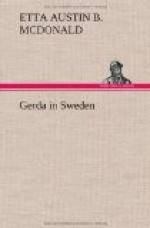The happy little party started early in the afternoon, and as they walked through the city streets, many were the curious glances turned upon the Lapp boy.
Erik wore a suit of Birger’s clothes, and although he was five years older, they fitted him well. He was short, as all Lapps are, and his face was broad, with high cheek-bones; but he had a pair of large, honest, black eyes which looked at everybody and everything in a pleasant, kindly way.
“What is that great, upward-going box?” he asked, as he caught sight of the Katarina Hissen, on the quay at the south side of the fjord.
“That is an elevator which will take you up to the heights above, where you can look over the whole city,” was Birger’s answer. Then he whispered to Gerda to ask if she thought they might go up in the elevator before going to the Deer Park.
Gerda shook her head. “It costs five oere to go up in the lift, and three oere to come down,” she replied. “That would be thirty-two oere for us all, and we must save our money to spend in the Djurgard. There is the boat now,” and she led the way to the little steamer.
“I have heard you say so much about Skansen,” said Karen, when they had found seats on the deck together, “that I’d like to know what it is all about.”
“It is all about every old thing in Sweden,” laughed Gerda. “The man who planned it said that the time would come when gold could not buy a picture of olden times—the old homes and costumes and ways of living—and then people would wish they could know more about them.
“So he travelled all over Sweden, from one end to the other, making a collection of all sorts of old things to put in a museum in Stockholm. Then he thought of showing the real life of the country people, so he bought houses and set them up in Skansen, and hired the peasants to come and live in them.
“When he finished his work, there was an example of every kind of Swedish dwelling, from the Laplander’s tent and the charcoal burner’s hut, to the farmhouse in Dalarne and the fisherman’s cot in Skane. And people were living in all the houses just as they had lived at home,—spinning, weaving, baking, and celebrating all the holidays in the same old way.”
“And there are cages of wild animals and birds too,” added Birger, “polar bears and owls and eagles and reindeer—”
“That is what I want to see,—the reindeer,” interrupted Erik; so when the steamer reached the quay at the Deer Park, the children went at once to find the Laplander’s tent in Skansen.
Erik stood still for a long time, looking at the rocks, and the Lapps and reindeer; and the twins waited for him to speak. Gerda expected that he would say it was just like home; but, instead, he turned to her at last and asked, “Do you think it is like Lapland?”
The little girl was rather taken aback at his question. “Well, you know, Erik,” she stammered, “they have done the best they could.”




